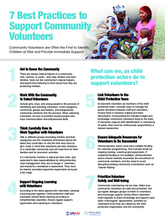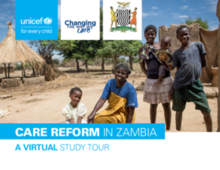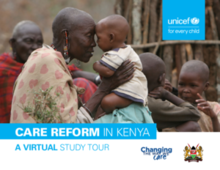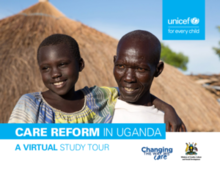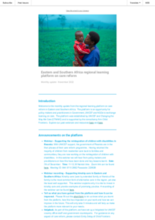Displaying 121 - 130 of 665
This article explores the role resilience processes play in education and well-being outcomes for street-connected children. It draws on research and practice undertaken as part of the Building with Bamboo Programme (BwB) on resilience. BwB investigated the forms a resilience-based approach might usefully take in practice, the effect this has on promoting resilience in children, and how this resilience leads to improved outcomes in their lives.
In this video Simon Kanyembo, Director of Social Services at ACE Zambia, addresses the following questions: why child welfare organizations should prefer family-based care to institutional care and response to children who are abandoned or unable to be reintegrated.
In this video Daisy Muzukutwa, Executive Director of ACE Zambia, addresses the following questions: financial viability of reintegration; future of institutional staff after the transition; and where to begin when considering a transition.
यस अध्ययनले सातवटा केन्द्रित देशहरूमा २१ अर्ध-संरचित अन्तर्वार्ताहरू समावेश गरी गुणस्तरीय अनुसन्धान अध्ययन सञ्चालन गरेर निजी रूपमा सञ्चालित र वित्त पोषित आवासीय हेरचाह संस्थाहरूको सानो संख्यामा COVID-19 को प्रभावको अन्वेषण गर्दछ।
This webinar will provide an overview of child protection system strengthening and the linkages between this approach and care reform. It will outline the ten components of a system strengthening approach to care reform and provide three examples of putting these components into practice. The examples will be presented by UNICEF country office staff, government agencies and their partners. They will focus on the development of the national care form strategy in Kenya, workforce strengthening for care reform in Rwanda, and care system assessment in Uganda.
A poster for Child Protection teams to emphasize the evidence based practices of engaging volunteers that were documented in the research.
This virtual study tour aims to provide you with an overview of care reform in Zambia from the comfort of your own home. Care reform relates to the care of children.
This Changing the Way We Care virtual study tour aims to provide an overview of care reform in Kenya from the comfort of your own home. Care reform relates to the care of children. It refers to efforts to improve the legal and policy frameworks, structures, services, supports and resources that determine and deliver alternative care, prevent family separation and support families to care for children well.
This virtual study tour aims to provide you with an overview of care reform in Uganda from the comfort of your own home. Care reform relates to the care of children.
This is the monthly update of the Eastern and Southern Africa Regional Learning Platform published in November 2022.


